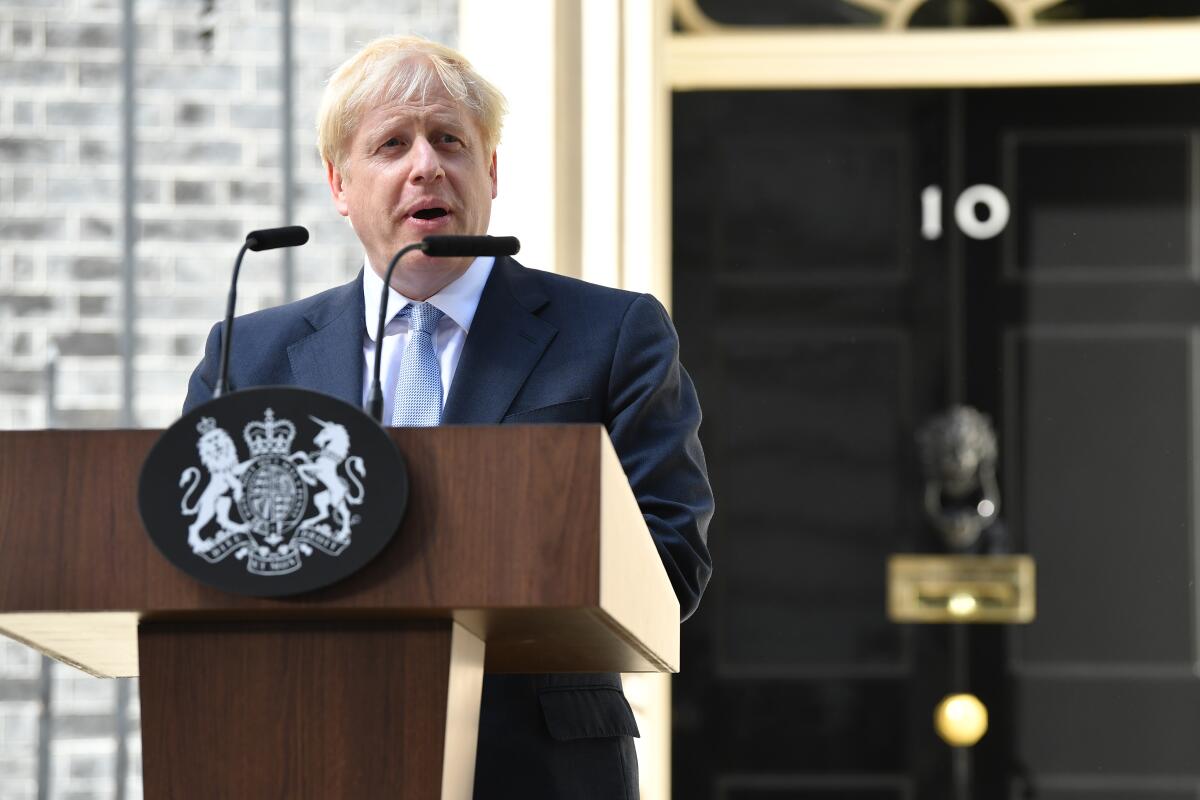Britain’s new prime minister sees ‘no-deal’ Brexit as possibility. What would that mean?

- Share via
LONDON — It’s a “remote possibility.” That’s what Britain’s brand-new prime minister, Boris Johnson, said Wednesday about prospects for what’s considered the worst-case Brexit scenario: crashing out of the European Union with no deal.
For those who have warned of chaos if that comes to pass, the new leader’s words offered scant reassurance.
Johnson’s first speech as prime minister was delivered just outside the glossy black door of 10 Downing St., the official residence vacated only hours earlier by his predecessor, Theresa May. His performance was vintage Johnson: brimming with confidence that bordered on bravado, his remarks laced with hyperbole but light on detail.
After more than three years of national angst and political infighting in the wake of the June 2016 referendum to split with the EU, Johnson voiced sunny optimism in the face of the Brexit deadlock that is widely viewed as Britain’s most serious crisis since World War II.
“The doubters, the doomsters, the gloomsters are going to get it wrong again,” he declared, adding that “people who bet against Britain are going to lose their shirts.”
In his speech, Johnson delivered what amounted to a breezy dismissal of May’s protracted and ultimately unsuccessful efforts to win lawmakers’ approval for a divorce agreement with the EU.
With 99 days remaining before the deadline, he pledged to secure “a new deal, a better deal” meant to unwind, in an orderly fashion, decades of complex entanglement with the most important economies of continental Europe.
Johnson made a grudging nod to the prospect that he too might fail, noting that the country needed to “prepare for the remote possibility that Brussels refuses any further to negotiate, and we are forced to come out with no deal.”
Economists say a no-deal Brexit — the overnight termination of agreements with the EU with no new ones in place — would cause an abrupt severing of supply chains and bring hefty hikes in import taxes and huge transport delays. In British supermarkets, fresh fruits and vegetables could become expensive and hard to find.
Living or traveling in Europe would suddenly become much more complicated for Britons who now have free movement across the bloc. Pharmaceutical groups have warned that some medications might become scarce, because three-quarters of them come from or via the EU.
Johnson insisted, though, that there was still adequate time for readiness in the event of a no-deal departure. “Not because we want that outcome — of course not — but because it is only common sense to prepare,” he said.
After the new prime minister formally assumed office, European leaders including German Chancellor Angela Merkel offered him a courteous welcome. But some EU lawmakers painted a stark picture of a no-deal Brexit, with a key panel saying earlier Wednesday that such a scenario would be “economically very damaging, even if such damage would not be inflicted equally on both parties.”
The European Parliament’s Brexit steering group said in its statement that Johnson’s hard-line stance during his campaign to win the party leadership — and thus the premiership — had “greatly increased the risk of a disorderly exit of the U.K.”
EU officials have already ruled out substantial changes to the deal struck with May, and Johnson has never spelled out how his efforts would differ from hers. And he unnerved some by reducing several of the most intractable issues to soundbite-style quips.
One key battle has been over the so-called backstop, the plan to avoid a “hard” border with checks and controls between the Republic of Ireland, which will remain in the EU, and Northern Ireland, which would leave the bloc along with the rest of Britain.
Johnson said he bore the ultimate responsibility for the backstop, which is considered to have potentially momentous consequences for the 1990s peace accord that stemmed decades of sectarian bloodshed in Northern Ireland. But he could not resist coupling that with a jokey reference.
“Never mind the backstop — the buck stops here!” he said.
Handovers of power in Britain are a brisk affair. Johnson assumed his new post just a day after results of a contest to lead the Conservative Party were announced. Under the British political system, Johnson’s victory in that vote gave him a mandate to become prime minister.
Earlier Wednesday, Johnson and May made separate visits to Buckingham Palace: she to curtsy to Queen Elizabeth II and tender her resignation, he to bow his tousled blond head and accept the monarch’s invitation to form a new government.
Throughout a long day that extended into late-night political maneuvering, Johnson began building his Cabinet, with hard-line Brexiters assuming most prominent posts, and some high-profile departures of those who deviated from that doctrine. Among those leaving was Johnson’s erstwhile rival Jeremy Hunt, who had said he hoped to remain as foreign secretary.
Although Brexit and its complications remained the chief order of the day, British media took time to consider Johnson’s domestic arrangements. His partner Carrie Symonds was in the audience when he spoke outside Downing Street, but it wasn’t clear whether she’d be moving in with him.
One thing won’t change along with the country’s leadership: Larry, the Instagram-ready Downing Street cat, stays put. Successive British leaders have explained that he is part of the prime minister’s household, not a personal pet.
Special correspondent Boyle reported from London and Times staff writer King from Washington.
More to Read
Sign up for Essential California
The most important California stories and recommendations in your inbox every morning.
You may occasionally receive promotional content from the Los Angeles Times.













